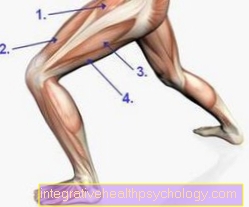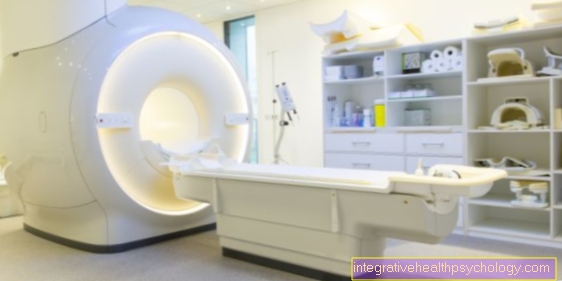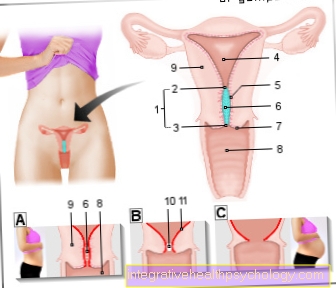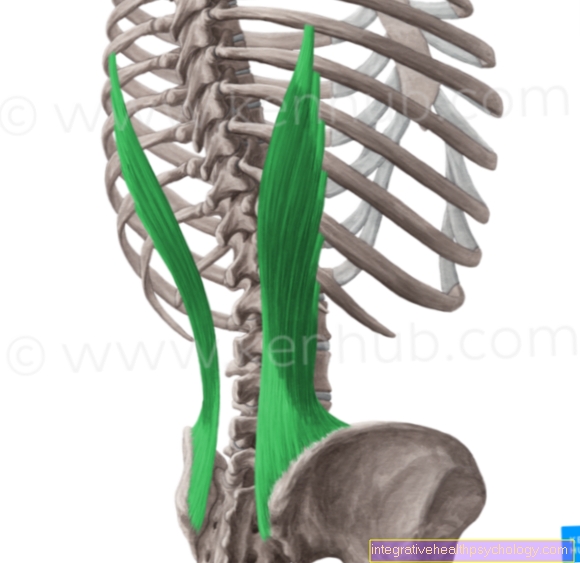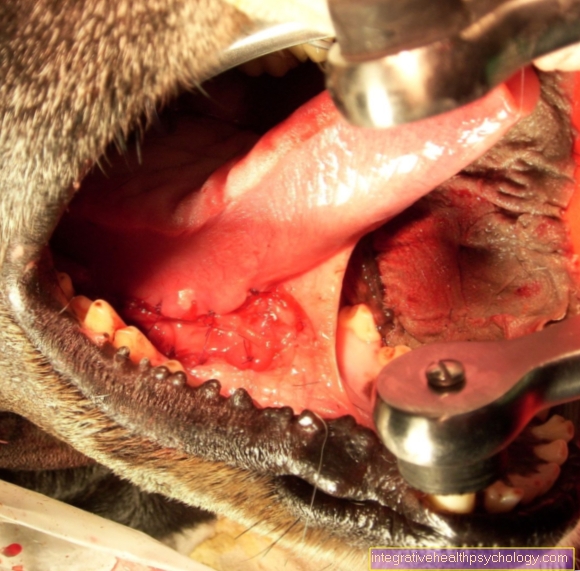Aftermath of anesthesia
introduction
An operation and the associated anesthesia place a special burden on the body, which is why it can react accordingly after such a procedure. These after-effects of anesthesia can vary greatly from person to person, both in number and severity. Complications can occur in the area of the cardiovascular system, but nausea and hoarseness are much more common, and delirium can occur especially in older people.
Pain is almost always an unwanted companion in the postoperative phase, but these are eliminated by the specialists on site if possible.

Typical aftermath
In the area of the cardiovascular system, the heart rate can rise, which is perceived as "palpitations". Blood pressure can also cause problems in both directions. Very often, high blood pressure is not noticed by the patient. If so, this can manifest itself in dizziness, headaches, nervousness, ringing in the ears or tiredness etc. The symptoms of low blood pressure can be very similar. Here too, dizziness, headaches, tiredness and shortness of breath can occur. Before these symptoms are noticed, they are usually combated, as the patient is closely monitored in the recovery room and then on the ward.
A common aftereffect after anesthesia is nausea and vomiting after anesthesia, also known as PONV (postoperative nausea and vomiting). Often the nausea is accompanied by pallor and cold sweat. Delirium is often feared, especially in older patients. It can manifest itself in disorders of consciousness and orientation or confusion, tremors, hallucinations, agitation or "restlessness" (is often used as a synonym), excessive sweating and palpitations. In addition, the affect is impaired: fear, tearfulness, but also euphoria and aggressiveness can occur. Furthermore, it can sometimes lead to a strong feeling of cold and restlessness, as well as hoarseness, which is due to the tube, the tube with which one is ventilated.
Read more on this topic:
- Aftermath of general anesthesia
- Side effects of anesthesia
Fatigue as an aftereffect of anesthesia
After anesthesia, there are very often various after-effects, which usually affect the patient for about a day.
A particularly common after-effect after anesthesia is fatigue. The fatigue after anesthesia is caused by the fact that the medication that is given to the patient before and during the operation to ensure that he sleeps deeply enough takes a certain amount of time to clear the body (eliminated) become. To do this, the drugs must be broken down in the liver and then excreted via the intestines or kidneys.
This takes longer for some patients and shorter for others, especially those who use sleep medication frequently and regularly. Thus, many patients experience a so-called "hangover", in which the drugs, which are administered during the anesthesia, so that the patient does not notice the operation, have an even longer effect. After the anesthesia, after-effects such as tiredness, nausea or abnormal sensations can occur. Fatigue is for many patients Nothing bad after the operation, as you can sleep more after the operation and thus give the body time to recover from the anesthesia and the operation. Usually the fatigue lasts about one to two days as after-effects after the anesthesia .
However, the patient may be given medication after the operation to relieve the pain and make him a little more tired so that the body gets a lot of sleep and thus the healing process can be stimulated more quickly.
Fatigue as an after-effect after anesthesia is completely normal and even if it is perceived as annoying for some patients, it is definitely a helpful after-effect of the anesthesia. However, if the tiredness persists even after a week, then it is probably no longer the after-effects of the anesthesia but the side effects of an administered drug.
You may also be interested in this topic: Anesthesia diversion - duration and procedure
Confusion as an aftereffect of anesthesia
The drugs that are used during anesthesia have a central effect on the brain and the nervous system. This leads to the desired effects, such as unconsciousness and the lack of pain sensation. Since drugs are broken down in different ways in the body, not all effects go away when the person wakes up. After waking up, those affected are often still in a state of confusion. This can be differently pronounced and also express itself differently.
Some people react aggressively, while others are more likely to have memory problems. The older a person is, the stronger the after-effects of anesthesia and thus also the confusion. The consequences usually subside within a few hours. However, in some cases there may be prolonged confusion. In this case, doctors speak of postoperative delirium, which can only begin a few days after the anesthesia. Some sufferers keep this disorder permanently. Risk factors for delirium are age, male gender, and some pre-existing conditions such as diabetes or high blood pressure.
Find out more about the topic here: Postoperative delirium.
Headache as an aftereffect of anesthesia
The anesthetic drugs can also cause post-anesthetic headaches for some people.
Those affected who are prone to migraine attacks are more likely to have headaches after surgery. Headaches after spinal anesthesia are a special case, as small amounts of cerebrospinal fluid are lost and this can also trigger severe headaches. In most cases, the headache is short-lived. In the case of longer complaints, further clarification should take place with an anesthetist.
Forgetfulness as an aftereffect of anesthesia
Many drugs that act centrally on the brain have an impact on memory. Some drugs are particularly known to cause what is known as retrograde amnesia.
This means that the memory is limited shortly before the anesthetic drug is administered. Sometimes those affected report that scraps of memory come back, but usually a memory gap remains. However, this can also be used specifically in order not to perceive traumatizing experiences such as certain treatments.
You may also be interested in this similar topic: Postoperative continuity syndrome
Nausea as an aftereffect of anesthesia
Nausea and vomiting are relatively common consequences of anesthesia. About a third of those affected report feeling sick after the procedure.
There are several reasons why these episodes are common. The vomiting center in our brain stem measures the concentration of toxic substances in the blood. Since the gastrointestinal tract is the natural absorption of many toxins, the body reacts with vomiting. However, this does not lead to a reduction in the concentration of the medication, which the body perceives as toxins, since in this case the medication is administered directly through the blood.
Another cause can be swallowing blood, especially during oral surgery. The body cannot digest this, and nausea and vomiting also occur.
Risk factors for drug-induced nausea are female gender, young age and known travel sickness. As a preventive measure, antiemetics can be started even during anesthesia. These prevent or reduce nausea. Not using anesthetic gases can also lower the risk of postoperative nausea.
Read more on the subject at:
- Vomiting after anesthesia
- TIVA- the anesthesia without anesthetic gases
Sleep disorders as an aftereffect of anesthesia
There are a number of causes for problems falling asleep and staying asleep, including some drugs that are used for anesthesia.
Psychological stress can also lead to sleep disorders and major interventions and anesthesia are always a burden for the body and the psyche. However, reliable evidence of the cause of a sleep disorder can rarely be found. Especially during the time in hospital, a sleep disorder can arise regardless of the anesthesia, as the environment and the situation can appear strange and threatening. Good sleep hygiene with a dark, not too warm bedroom and regular bedtime can often limit the sleep disorder.
Also read our article: Sleep Disorders
Depression as an aftereffect of anesthesia
After anesthesia, after-effects such as depression or tiredness and nausea are quite normal, but they should only occur for a short period of time and should not persist for longer.
In general, on the first day after the operation, typical after-effects such as increased nausea and an increased need for sleep as well as states of confusion can occur. In rare cases, the after-effects of anesthesia can lead to depression, which can be described primarily as a reduced drive, joylessness and an increased need for sleep with simultaneous insomnia.
If depression occurs for the first time after an operation, it is important to inform the doctor about this and to get help from a psychologist or psychiatrist after leaving the hospital so that the depression does not solidify.
A slight upset after an operation is completely normal, but if the anesthesia causes depression that lasts longer than a month, there is a risk that the patient will develop a long-lasting depression which then solidifies, which is why it is all the more important , see a doctor early for mental problems (psychiatrist) to visit. The depression caused by anesthesia after-effects, however, often only shows up one to two weeks after the operation and often disappears on its own as soon as the patient is back in his usual environment and has survived the rigors of the operation well.
In general, long-lasting after-effects of anesthesia such as depression rarely occur, but first signs such as increased exhaustion or persistent depressed mood should be taken seriously so that the depression does not become chronic, i.e. the depression does not advance.
Also read:
- This can be done with depression
- Signs of depression
Fluctuations in blood pressure as after-effects of anesthesia
During general anesthesia, all circulatory functions, such as blood pressure, are controlled with drugs.
After stopping the medication, the body must slowly take over its tasks again. This can lead to fluctuations in blood pressure. Especially those affected who have had high or particularly low blood pressure in their medical history and who also treat it with medication have difficulty adapting to anesthesia. In most cases, the pressure levels off automatically after a short time. Immediately after waking up, those affected should not jump up immediately, as this can cause the blood pressure to drop briefly and there is a risk of falling due to dizziness.
Hair loss as an aftereffect of anesthesia
General anesthesia puts the body under great stress. The drugs act on every area of the body and have some side effects on the cells. In addition, there is also a psychological burden, since an operation and general anesthesia are always exceptional.
This combination can lead to slight hair loss postoperatively. However, this regulates itself and is usually only visible on the increased hair in the brush and not directly when looking at the person concerned. Other theories about this hair loss are discussed, but there is no evidence for them.
More on this: Causes of Hair Loss
Aftermath in children
Just like adults, children react very differently to anesthesia.
The drugs that are used during general anesthesia have a central effect on the brain, which is why children and adults can show unusual behavior after anesthesia. Anesthetic aftereffects in children occur mainly after longer or major operations and are completely normal, which is why parents should not be very concerned. Since an operation is a great psychological burden for many children and is associated with many fears, great care is taken during anesthesia to ensure that the child sleeps deeply enough at all times.
Confusion and memory disorders often occur immediately after waking up. Children of kindergarten age in particular also show strong states of restlessness and rage and scream because they cannot assess the situation. This behavior usually subsides after a few minutes to hours and the children calm down. In some cases, children complain of nausea and dizziness after anesthesia. This should also resolve itself after a short time. Headaches and sleep disorders are also reported.
During the time in which the gases and medication are still in the child's body, there will be anesthetic after-effects in the child, whereby the child can often be tearful to agitated and restless. Depending on the operation, there may also be further anesthetic after-effects in the child, such as brief paresthesia in the operated area or sore throat caused by the ventilation tube.
With children in particular, these sleep disorders are often the result of the unknown environment and the unfamiliar situation. Due to the dizziness and balance disorders, the children should not actively participate in road traffic for a day even after small, outpatient operations.
Read more on the topic: Anesthesia in children
Aftermath in the elderly
The after-effects of anesthesia in the elderly are often much stronger than the after-effects in young patients and in rare cases can lead to permanent changes in the elderly.
In addition to the classic symptoms that occur after an operation, such as tiredness, nausea or slight states of confusion, after anesthesia in older people there are after-effects such as severe states of confusion or long-term exhaustion.
The reason for this is that in many older patients organs such as the liver or kidneys no longer function as well as in a young, healthy patient, so that the drugs are metabolized more slowly and remain in the body longer.
Furthermore, the brain of older patients is much more susceptible to the anesthetic aftereffects than the brain of a young patient, so that the anesthetic gases and also the medication for sleeping have a more intense effect and thus also show stronger aftereffects.
Many patients fear that after anesthesia there will be after-effects in the elderly that affect the brain so much that the patient will develop symptoms similar to dementia.
This is mainly due to the fact that some elderly patients are very forgetful and confused for long periods of time after surgery. Whether there are after-effects in older people after anesthesia, which should be regarded as Alzheimer's disease or dementia, is currently a controversial issue.
It is assumed, however, that anesthesia can damage the elderly patient over a longer period of time, resulting in dementia-like symptoms or dementia.
This anesthetic aftereffect in the elderly occurs more often after long and complicated operations. In general, however, it is quite rare for long-lasting disturbances to occur, so that the normal anesthetic after-effects in older patients should not be interpreted directly as dementia, as it is completely normal for confusion states to occur after the operation.
For more information on anesthesia in this group of patients, see: Anesthesia in the elderly
After-effects of anesthesia during a gastroscopy
With a gastroscopy, some people will be given general anesthesia.
Basically, the after-effects of anesthesia are just like any other anesthetic. Dizziness, nausea, impaired memory and confusion are possible. Further after-effects, such as the hoarseness and sore throat, are more likely to result from the introduction of the gastroscope or from intubation than to the anesthesia itself. General anesthesia for gastroscopy is usually only performed for anxious sufferers and people who are unable to work properly.
Read more on the subject at: Anesthesia during a gastroscopy
causes
An increase in heart rate and blood pressure at the same time can have different causes, often there are wound pain, an overcrowded bladder or a lack of oxygen (Hypoxia) is based on the increase in the two parameters.
On the other hand, it can also lead to a drop in blood pressure, which is usually an expression of a volume / fluid deficiency in the vessels. This can be due to insufficient fluid intake during the operation or postoperative bleeding.
Pain occurs relatively soon after the patient wakes up, especially if the very short-acting opioid remifentanil is used. Opioids are pain-relieving substances that are also used for anesthesia, among other things.
The stimulation of the vomiting center in the brain stem or the messenger substances that bind to this region in the brain and thereby stimulate it are responsible for the development of nausea. About every third person is from PONV (postoperative nausea and vomiting), especially young people, women and non-smokers are affected, as well as people who suffer from motion sickness. There are also inhalation anesthetics that increase the risk of developing PONV, and giving opioids (pain relievers) after surgery increases the risk of nausea and vomiting.
The frequently occurring feeling of cold can be explained by insufficient warming during the operation and / or a dilatation of the blood vessels, often caused by medication, which increases the loss of heat through the skin.
Delirium mainly affects patients who already suffer from mental disorders such as dementia, who consume a lot of alcohol or who are simply getting older. It can develop, among other things, from the administration of medication during the operation.
Many of the causes described above can be avoided with proper anesthetic diversion. You can read everything about this topic under: Anesthesia diversion - procedure, duration and risks
therapy
The blood pressure can be increased with so-called sympathomimetics, such as adrenaline. There are many ways to lower blood pressure, e.g. ß-blockers, ACE inhibitors or alpha receptor blockers.
There are also numerous options for treating pain, the most commonly used are opioids (pain relievers), the most well-known of which is morphine.
Alternatively, one can use antipyretic (antipyretic) or give anti-inflammatory drugs such as paracetamol or ibuprofen.
Fortecortin or Vomex can be used against nausea.
The delirium is often treated with cholinesterase inhibitors (anti-Alzheimer's drugs) or psychotropic drugs. If necessary, ask your doctor about this.
forecast
All of the aftereffects described are limited and will pass in the foreseeable future, usually after a few hours to days.
Postoperative delirium also has a good prognosis; it will pass as soon as the cause is eliminated. However, another organic cause (such as poisoning) should be ruled out.
Duration of the aftermath
The Duration of the aftermath after anesthesia vary greatly and depend primarily on the patient and the duration and type of the operation.
Especially female patients who do not smoke and who frequently suffer from nausea when traveling are affected by after-effects after anesthesia and in these patients the duration of the after-effects of the anesthesia is often longer than in male patients who smoke a lot.
The reason for this is the fact that patients who smoke are better used to certain ingredients that are contained in cigarettes and also in the anesthetic gas, which is why their body and especially the brain already knows the substances.
This means that the duration of the after-effects after the anesthesia is only short while, on the other hand, patients who do not smoke and who generally get sick quickly suffer from the after-effects of the anesthesia for a longer period of time.
The duration of the after-effects of the anesthesia does not only depend on the patient but also on the type and duration of the operation. A longer operation means that the duration of the after-effects of the anesthesia is also lengthened, since the body has been exposed to the anesthetic gases for a much longer period of time and thus has a higher concentration of the gas in the body.
The type and course of the operation also play an important role in the duration of the aftereffects anesthesia. If, for example, problems arise during anesthesia during the operation, such as the patient no longer sleeping deeply enough or he or she is still moving his muscles slightly without knowing it, the anesthetist may increase the dose of some medication This means that optimal anesthesia and thus optimal sleep for the patient must be guaranteed.
However, this also means that the duration of the after-effects after anesthesia is prolonged and that the patient is ill for longer after the anesthesia or that he feels sleepy or not completely oriented.
However, the patient often does not really notice the longest duration of the after-effects after anesthesia, because although he is awake, he is not really aware of this due to the medication.
During this time, the patient is in the so-called recovery room and is monitored by various devices until he is awake and oriented enough to be transferred to a normal ward. In general, the duration of the after-effects of anesthesia is usually long some hours. It takes about a day until the patient no longer feels any after-effects. In very rare cases, however, it can be that the brain reacts very sensitively to the anesthetic gases and that small after-effects of the anesthesia occur again and again even after weeks. This can take the form of nausea or increased drowsiness express.
In general, however, the duration of the after-effects of the anesthesia is about one day, after which the patient should be fit again, even if the nausea can sometimes persist.
prophylaxis
There is hardly anything that can be done about the aftereffects of anesthesia; it is usually not up to the patient how he or she reacts to the anesthesia, but capable anesthetists are aware of this and choose the most compatible ones Narcotics out.

